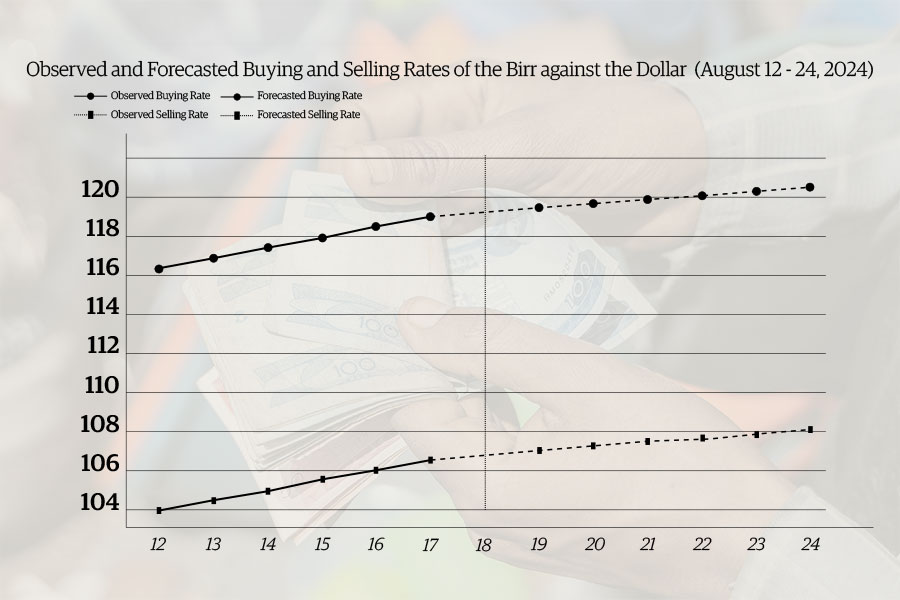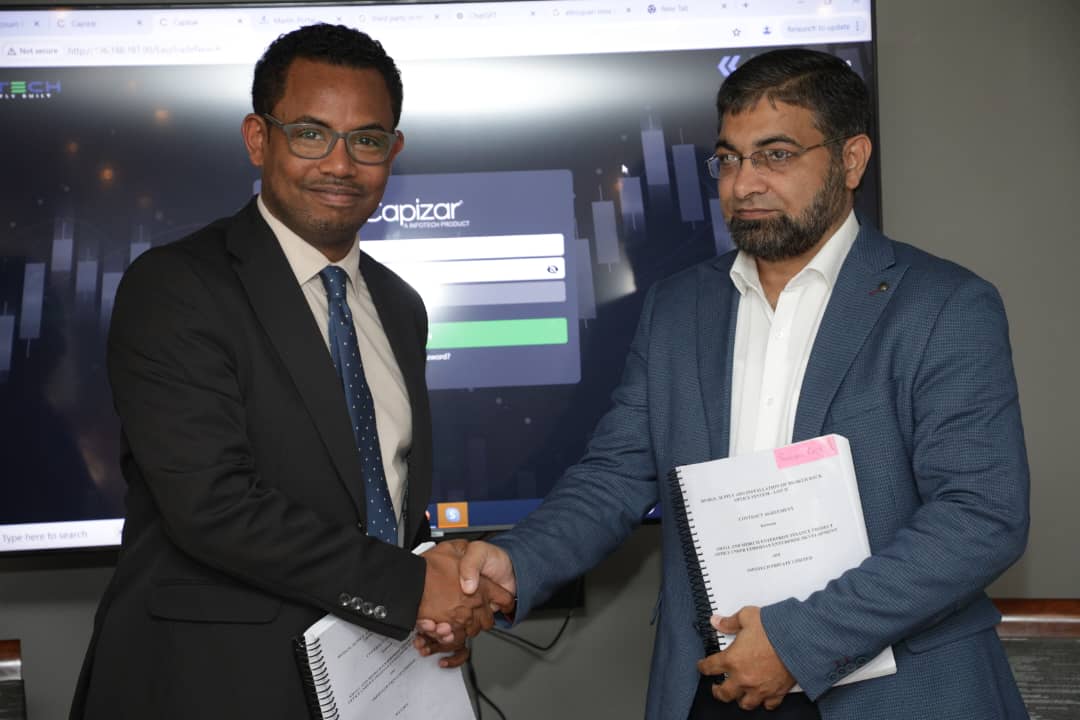
Fortune News | Nov 27,2022
Oct 8 , 2022
By Gobeze Dessalegn
CFO forums offer stakeholders an opportunity to come together to find practical solutions for Ethiopia's critical financial challenges, facilitate a result-oriented networking platform for finance professionals, and create a visible impact by becoming commanding voices of the finance profession. They could also be insightful when it comes to issues as pertinent as IFRS implementation, writes Gobeze Dessalegn, director of Learning Solutions at HST and CFO Forum team leader.
Most major corporations have a Chief Financial Officer (CFO), a senior executive in an organisation managing the financial actions of a company. The CFO is one of the key people to provide programmatic and operational support to the company, supervising the entire finance unit and is the chief financial spokesperson for the organisation.
The role of the CFO has undergone a profound transformation in recent years, once seen as an organization's head accountant and primary bookkeeper. Rather than entirely focusing on numbers, budgets and reports, CFOs are adopting a much broader approach, changing how they add value to their business.
As well as managing finances, today's CFOs increasingly expect to provide guidance and advice to the CEOs and board on ranges issues. Instead of being a functional role, the offices of CFOs have become one of strategy and insight. A forum recognising this position is thus overdue.
CFO Forum Ethiopia is the first locally organised event for CFOs, owned and hosted by HST [where the author of this article is the director], in partnership with the Association of Chartered Certified Accountants (ACCA) Ethiopia. An annual event creates a platform for 200 or more CFOs and other finance professionals in the same category to come together and brainstorm on the country's critical financial issues.
Why a forum? What is its relevance?
Under the Forum, stakeholders come together to find practical solutions for Ethiopia's critical financial challenges, facilitate a result-oriented networking platform for finance professionals' informal discussion and idea sharing, and create a visible impact by becoming commanding voices of the finance profession.
Such forums are designed to keep CFOs informed on relevant, timely issues, providing a platform for collaboration and connection. They bring together CFOs, Finance Directors, Finance Managers and other senior finance executives to discuss their rapidly evolving roles amid ongoing regulatory and economic developments. Unlike ample networking, such forums enable CFOs across diverse industries to share common challenges, insights, and solutions to pressing challenges.
It is also critical that it is CFO-driven. At most Forums, CFOs drive the agenda, discussing and responding to the most demanding challenges they face and exchanging actionable insights. No less pertinent are peer-to-peer connections. In today's business climate, where CFOs encounter many challenges, it is essential to foster an environment that not only merits a CFO's time but also provides opportunities to network and talk candidly with peers. CFO forums set aside ample time for networking, enabling CFOs across diverse industries to share common challenges, insights, and solutions to pressing challenges.
The CFO Forum is meant to come up with different themes for each year, considering the issues' significance and urgency. Topics covered during CFO Forums could be technology disruption, the global economy, the changing tax landscape, risk management, sustainability, finance transformation, retirement and pension risk, capital markets, compliance issues, finance talent, and health care.
The theme chosen for the 2022 forum is "Ethiopia's IFRS Implementation - the Journey To-date and the Way Forward." The country has been on the road to adopting International Financial Reporting Standards (IFRS) over the past years. More than 70pc of the world's countries have adopted the global financial reporting framework promulgated by International Accounting Standards Board (IASB). The need for initial issuance and later global acceptance of these standards revolved around the 2008 Asia Financial Crisis, the Globalization of the Free Movement of Capital Across Markets, the formation of the European Union, and the 2008 Global Financial Crisis. The key benefit of the global reporting framework, among others, is the harmonisation of the scattered national standards, enhancing easier understanding and comparability of financial statements.
Within the CFO Forum, it is critical to address the rampant challenges of IFRS implementation since its adoption in Ethiopia and pinpoint action steps to expedite the way forward. Here, several issues are relevant.
The first is what the problematic and impractical standards from the Ethiopian context are.
Options available to nations in deciding financial reporting frameworks are to use locally developed reporting standards and fully adopt the global standards (IFRS) or IFRS convergence (use of local means in-line with IFRS) instead of full adoption.
Each option has its pros and cons. Ethiopia has chosen to adopt the IFRS fully. There is no halfway implementation in this regard. It should be done thoroughly, spanning all IFRSs, IASs, application guidance and interpretations. Yet, considering the context of specific countries adopting IFRS, all standards may not be equally applicable, and some measures might not be practical to implement.
Which standards fall in these categories from the Ethiopian context, and what actions should be taken by AABE, the regulator, and the reporting entities?
One of the Standards falling into these categories is the Fair Value Measurement, under IFRS 13, and many other standards using the fair value concept. This is because of the difficulty in obtaining or measuring fair value through all allowed approaches, whether market, income or replacement cost.
Other standards falling into these categories are IFRS 9 and 7, which deal with financial instruments' measurement and disclosure. The difficulty in size (whether at fair value or amortized cost) and extensive disclosure requirements, considering the nature and areas of emphasis of users of financial statements in Ethiopia, might be too time-consuming for preparers and auditors.
Another relevant discussion point is the roadblocks faced in IFRS implementation, mainly related to property and actuarial valuation and the shortage of experts and expertise.
Debate and solutions ought to provide on critical issues believed to impede the effective transition to and subsequent implementation of IFRSs, covering, among others, scarcity of IFRS-related experts and expertise (both internal and external); higher education accounting syllabus and IFRS training issues; and the shortage of accredited and licensed property valuers and actuaries.
It will also be essential to bring attention to standards requiring emphasis by reporting entities in Ethiopia. There are many standards relatively practical and not difficult to apply but were not given the attention they deserve, including, among others, accounting policies, changes in accounting estimates and errors; events after the reporting period; borrowing costs; impairment of assets; and property, plant and equipment (PPE).
The case point of PPE, under IAS 16, is a practical example as it is more understandable and practical. On the one hand, many of its provisions are disregarded or misapplied. It covers initial measurements, the component of initial costs capitalised; subsequent costs, the element of following costs capitalised; subsequent measurement, whether PPEs revalued, and if yes, how often and whether evaluations are done by a class of assets or as a whole; and depreciation, including the depreciable amount, the depreciation method and depreciation rate.
Such issues can be digested, brought to the attention of stakeholders, and resolved through discussion platforms such as the CFO Forum.
PUBLISHED ON
Oct 08,2022 [ VOL
23 , NO
1171]


Fortune News | Nov 27,2022

Editorial | Mar 06,2021

Money Market Watch | Aug 18,2024

Radar | May 18,2019

Exclusive Interviews | Dec 23,2023

My Opinion | Mar 09,2019

Radar | Aug 20,2024

Radar | Sep 27,2025

Commentaries | Oct 26,2019

Radar | Apr 30,2022

Photo Gallery | 173862 Views | May 06,2019

Photo Gallery | 164088 Views | Apr 26,2019

Photo Gallery | 154163 Views | Oct 06,2021

My Opinion | 136587 Views | Aug 14,2021
Editorial | Oct 11,2025

Dec 22 , 2024 . By TIZITA SHEWAFERAW
Charged with transforming colossal state-owned enterprises into modern and competitiv...

Aug 18 , 2024 . By AKSAH ITALO
Although predictable Yonas Zerihun's job in the ride-hailing service is not immune to...

Jul 28 , 2024 . By TIZITA SHEWAFERAW
Unhabitual, perhaps too many, Samuel Gebreyohannes, 38, used to occasionally enjoy a couple of beers at breakfast. However, he recently swit...

Jul 13 , 2024 . By AKSAH ITALO
Investors who rely on tractors, trucks, and field vehicles for commuting, transporting commodities, and f...

Oct 11 , 2025
Ladislas Farago, a roving Associated Press (AP) correspondent, arrived in Ethiopia in...

Oct 4 , 2025
Eyob Tekalegn (PhD) had been in the Governor's chair for only weeks when, on Septembe...

Sep 27 , 2025
Four years into an experiment with “shock therapy” in education, the national moo...

Sep 20 , 2025
Getachew Reda's return to the national stage was always going to stir attention. Once...

Oct 12 , 2025
Tomato prices in Addis Abeba have surged to unprecedented levels, with retail stands charging between 85 Br and 140 Br a kilo, nearly triple...

Oct 12 , 2025 . By BEZAWIT HULUAGER
A sweeping change in the vehicle licensing system has tilted the scales in favour of electric vehicle (EV...

Oct 12 , 2025 . By NAHOM AYELE
A simmering dispute between the legal profession and the federal government is nearing a breaking point,...

Oct 12 , 2025 . By NAHOM AYELE
A violent storm that ripped through the flower belt of Bishoftu (Debreziet), 45Km east of the capital, in...